Heroes on Horseback in India: Relief Riders International

Riding horses. Bringing relief. Photo courtesy of Bhanu Pratab Singh Ratore.
What could be more poetic than a hero on horseback? Relief Riders International leads horseback rides through the Rajasthan Desert to provide medical and economic relief to Indian villages while giving service-minded tourists the chance to experience India's truly magical landscape. What a great adventure! Founder Alexander Souri gives us a closer look.
Tell us about the program.
Relief Riders International provides all-encompassing relief to poor villages around Rajasthan. Volunteers participate in the unique experience of riding on horseback through the desert to provide numerous welfare programs for poor villagers: free eye surgery, free dentistry, free pediatric care, HIV/AIDs prevention awareness, and donating livestock to widows. The program is in its tenth year. On each ride, we stop along to way to set up our various relief camps that provide the following programs:
1. Livestock Donation: Each trip delivers about 20 to 30 goats to people who qualify for a low-poverty level status. We focus on widows because they have no form of revenue. Treated as bad luck and shunned by their communities because their husbands have died, they are often sequestered and don't get fed. Goats give them access to milk, food, and other farming products.
An interesting result we've found is that a lot of communities have pooled together the goats we give them. They send them out to a collective and hire goat herders who graze them, milk them, and give them back to the community. It has become a community management system for the elderly that provides them with a larger opportunity for revenue, something severely lacking in these villages.
2. Pediatric Care: Our pediatric care program focuses on deworming children, the most powerful and simplest solution to child mortality in developing countries. For a child with a weak immune system who lacks regular nutrition, all it takes is a small parasite to lead to serious illness and often death. Taking care of these parasites is crucial to child growth. We spearheaded this program when no one else was doing it. UNICEF found out about the work we were doing and a spark was created that reignited the child deworming campaign in India. Eventually the government saw how crucial deworming was to child health, and it now provides many of these services to children for free.
Our close collaboration with UNICEF has also allowed us to become involved with their hand washing program, which teaches kids proper sanitation. The amount of diseases people can avoid with simple sanitation is astounding.
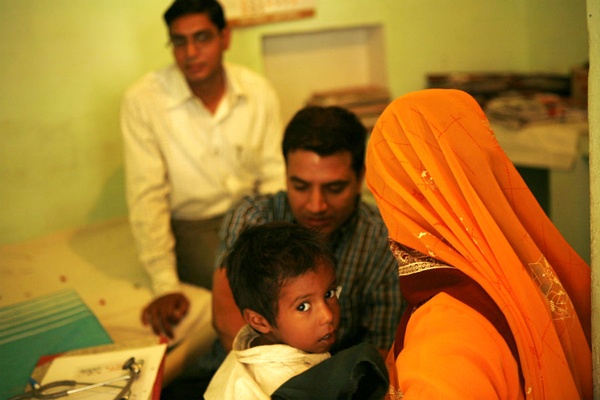
As seen at a pediatric relief camp. All photos courtesy of Marc Lecureuil.
3. Eye Surgery: Another one of our major programs is free cataract and eye surgery camp. Many of the elderly suffer from cataracts due to poor hygiene, nutrition, and harsh conditions, causing them not only major health issues, but to become a burden to their family and the community. When they can no longer see they become a liability. Their granddaughters take on the responsibility of caring for them, forced to sacrifice both their childhoods and their educations. Burdening the family causes a severe emotional pain and frustration that we hope to relieve the elderly of by performing these surgeries. Not to mention solving vision problems.
4. Dental Care: Dental hygiene in India is very poor. Villagers are exposed to precancerous substances from tobacco chewing that cause lockjaw, cancer, and other serious oral health issues. We work with young dentists from dental colleges, setting up camps that combine our free eye surgery and dental programs, and have seen as many as 950 patients in an eight-hour day.
5. HIV / AIDS Awareness: A program we have provided in the past involves spreading HIV/AIDS awareness among the villages. We put on interactive plays about infected communities involving both the volunteers and villagers, allowing people to react to potential disease and infection. We feel that they can better cope with the reality of the disease by creating real-life scenarios that allow the illness to be discussed in an open, educational platform.
And we're always looking for more...
We're constantly finding new ways to provide relief. We're launching a new program in two months that involves digging a well and developing a septic system in one of our villages. Most schools in the Rajasthan don't have bathrooms, and children have no choice but to do their business outside, in the open. Girls are forced to expose themselves in front of boys, leading to serious issues of male violence. We plan to rebuild the bathroom at a school in one of our villages, creating a private bathroom for girls. This is a prototype program, and we're really excited about it.
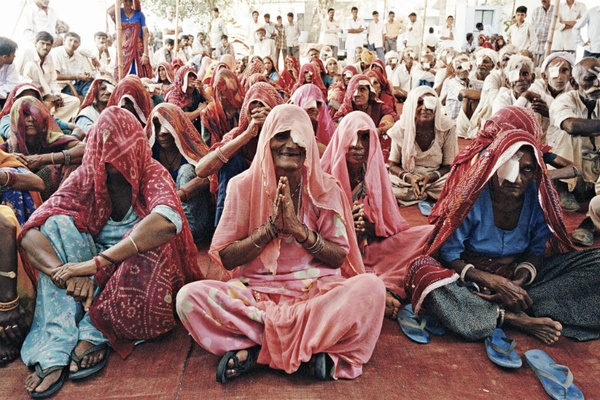
You were a film producer before founding Relief Riders. What inspired you to create the program?
I created Relief Riders after I had gone through a difficult time losing my father and four of my friends. I woke up after that and peeled away a few more layers of the onion, so to speak. All of the skills I had gained working in the film industry were able to congeal and allow me to envision this organization. Experencing loss allowed me to get a deeper sense of what I was meant to do.
I chose India because my father was Indian, and after I lost him I felt a deep desire to explore my connection with him. I went back to India in 2002 for the first time in 20 years. I had spent four years at a strict British school in India growing up, and it was a traumatic experience for me. It really curved my emotional relationship with my father. So I finally went back to India in 2002 and decided to forgive, to put that part of my life away, and to embrace my father's life and his home country. I had always loved riding horses. When my dad died a lot of this stuff came back. I created the program as part of my cycle of healing, of dealing with these losses.
Who is the trip best for?
First and foremost, the trip is for people who can ride horses. Volunteers who sign up for this trip need to feel comfortable on horseback for long days of riding (maybe 4-6 hours).
When I realized that horseback riding appeals to a small niche market in America, I decided to create two riding groups — a "scenic" group and an "advanced" group — to open up the trip to volunteers with all levels of riding experience. The scenic group is paced to the least experienced rider — a walk or a trot, while the advanced group canters and lopes at an endurance pace. I find that on most rides, volunteers progress and become really comfortable on horseback. The blend of humanitarian work and adventure shows people that they can do a lot more than they thought.
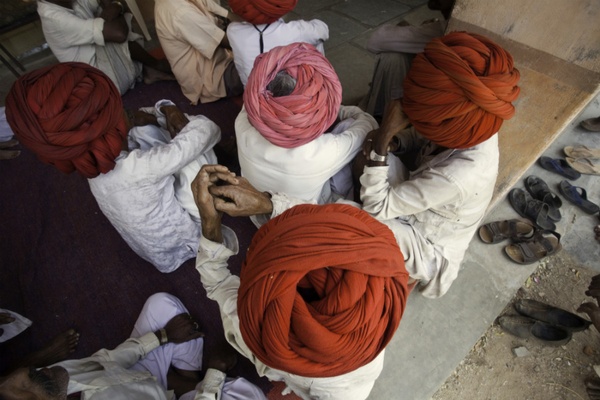
Colorful turbans of the Rajasthan.
How can volunteers without a medical background help?
The rides are predominantly for non-medical professionals. Each program is designed so that riders can work and support the doctors who provide care at our relief camps. There is so much support work to be done when doctors are seeing upwards of 900 patients a day. Volunteers help with introductions, distributions, orchestrating delivery, and registering patients.
At our pediatric camp, we allow kids to ask the riders any questions they want, and the riders can ask questions in return. This creates an opportunity for cultural education and exchange between volunteers and patients. Our dental care program needs a dental assistant, as well as those who want to participate in fluoride and tobacco chewing studies. Each camp has a table, supervised by doctor, who works with two to four riders to organize antibiotics, gum paints, mouthwash, and other necessary dental and medical supplies. Riders also participate in the non-medical related programs such as livestock distribution and HIV/AIDS awareness prevention.
Recently, we have found that a large number of doctors have joined the rides. Since Doctors Without Border's requires a commitment of six months, Relief Riders provides a unique opportunity for doctors who are still practicing and want to partake in this sort of work for a shorter amount of time without giving up their jobs back home.
Tell us about a ride. What can volunteers expect?
Rides are fifteen days long, with ten to twelve days spent on horseback, four to six hours a day. Volunteers arrive in New Delhi and spend the first day touring before meeting in the desert to head off on horseback.
The trip is a combination of riding through the desert, setting up camp, and stopping in various spots along the way to provide different forms of relief. We'll ride for four to six hours, camp, go to a village and provide pediatric care for a few hours, and then distribute goats in afternoon. The next day we'll set off to ride again for four to six hours, and set up our eight-hour free eye surgery and dentistry camp. Once on each ride we'll stop to provide our HIV/AIDs prevention awareness services, or deliver educational materials to a school. All of our programs are offered on each ride. I lead the volunteers on each ride along with a doctor and executive medical director.
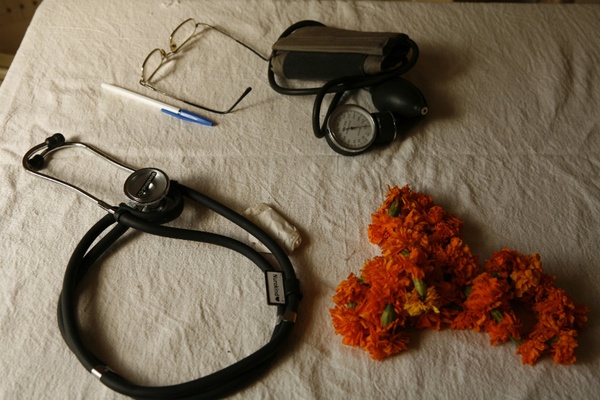
Stocked with supplies.
Why horseback riding?
I never really meant to approach the program as a horseback riding trip. I wanted to create a business system that could sustain itself on the interest of people who wanted to do good in the world. I've always loved riding, and I knew that I didn't want the program to be an air-drop experience. I wanted riders to have a deep connection with each other, the villages, and the land. The ride offers people a dynamic trip that allows them to grow as well as help others. It creates a unique experience of helping other people through helping oneself.
What is your favorite part about the rides?
When I know that I am going out to the desert with a group of people who are as enthusiastic about riding and humanitarian work as I am. It's such a fantastic adventure, and I love watching everybody enjoy themselves. I'm not a martyr, and I don't expect to save the world. I just want everyone to have a good time, enjoy horses, enjoy the desert, and enjoy the humanitarian work they are doing.
Tell us about a picture-perfect moment from one of your rides.
Riding through the desert past quiet villages, dimly lit by a full moon. It really makes you think: where am I? Traveling on horseback through the large dunes is also incredible. I like to take the riders straight up a very tall dune. Its like going up a four-story building. It gives an immense vantage point of the desert.
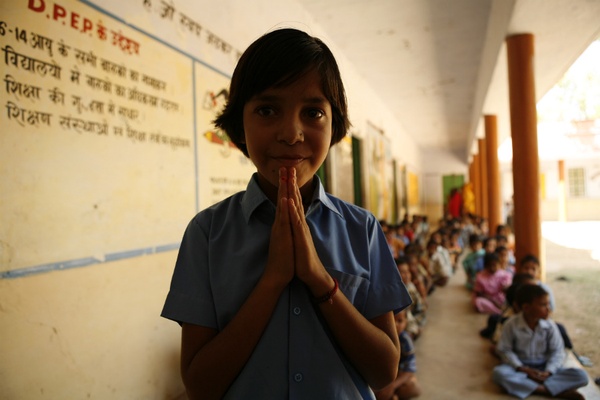
Grateful children say thank you to new Relief Rider friends.
What is one thing people should know about these villages in Rajasthan that they don't?
When you go to India with a standard tour company, you really don't get the full experience. You go to major cities and see all the famous sites, but you don't get a feel for the way people really live in this country. Relief Riders is about having a dynamic immersion. There are so many oddities that volunteers could never imagine. Many of locals don't even know how old they are. You go to India and you realize that time is defined so differently, and that this has such a huge effect on everyday life. You realize just how numbers control-oriented we are, how we live by such a rigid interpretation of time. These people operate on the sun, the moon, and whatever happens in between.
What advice do you have for entrepreneurs who want their businesses to have an aspect of global giving?
Just do it and don't give up or talk yourself out of it. You can never know enough, but you can always learn what you don’t know. Be a dreamer and make it happen. Just like in life, one has to accept the unkown. Answers often come from unexpected places.
Where do you want your company to be in five years?
This year marks our tenth anniversary. We've taken 25 Relief Rides and have developed six powerful programs which have treated close to 23,000 people, 16,000 of whom were children. The next five years will see Relief Riders International develop additional programs and create varied itineraries through Rajasthan.
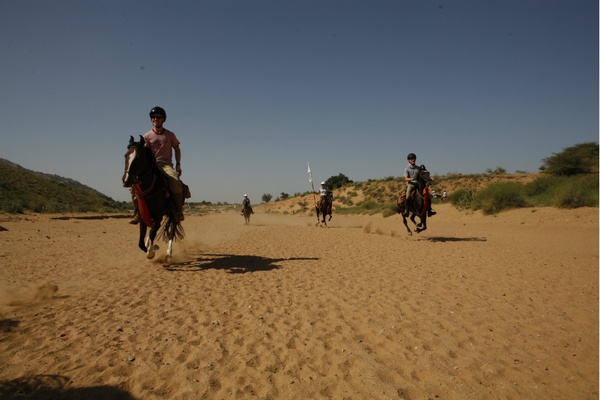
BUT WAIT, THERE'S MORE
To the Horses of Humanity
All Aboard the World's Most Charitable Ship
How I Got Hooked on Haiti
